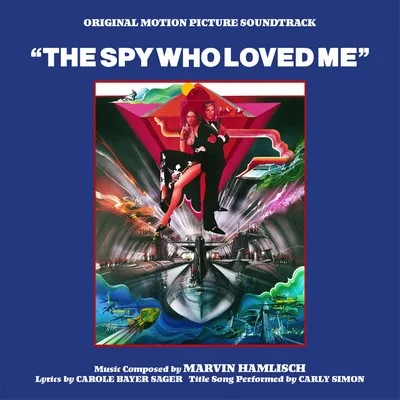The Scoring Session - The Spy Who Loved Me
At the end of May we lost the incomparable Roger Moore, and July 2017 marks the fortieth anniversary of his most iconic Bond movie: The Spy Who Loved Me. This site has spent June celebrating Sir Roger and we’re wrapping that up in this piece as we look at the score for the classic 1977 Bond movie.
In our first foray into The Scoring Sessions we talked about John Williams’ use of leitmotif to score Superman: The Movie, and it’s worth noting that the kind of score Williams employed is very much what we’re used to in 2017. This type of score has not always been the most common; in fact prior to Williams and Jerry Goldsmith sort of leading the renaissance of motif driven thematic scores in the mid to late seventies, the most common kind of film score was the thematic incidental score.
A Thematic Incidental Score is where the composer writes a single main theme for the film, kind of a unifying piece of music that can appear again and again throughout the movie, they then craft music for each scene of the movie individually leaving the “main theme” as the connective tissue to put the often-disparate pieces together. Bond movies from the 60’s and 70’s are a perfect example of this kind of scoring ethos. When you look at a classic James Bond score you’ll find that they all follow a similar formula: They begin with a rousing piece that sets pace to the action of the opening sequence, using the Bond theme to introduce James before transitioning into the opening credits. The main theme of each Bond film is usually the orchestral version of the movie’s title song. From there we’ll hear a soft melodic piece for our Bond Girl, we’ll hear a percussive piece for each of our big action set pieces and the Bond theme will be peppered in throughout. Often the individual songs throughout the film will use genres and instruments associated with the area the film takes place in. If, for example, James meets the Bond Girl in Paris the score will employ an accordion and will exemplify a lilting Parisian style.
The year was 1977 and composer John Barry was having some issues with income tax evasion that prevented him from returning to the United Kingdom. Barry had been the composer for every one of the James Bond films to that point, with the exception of 1973’s Live and Let Die, and Executive Producer Albert “Cubby” Broccoli was very fond of Barry and his work. He was not however fond enough to pay the money to ship a work print of The Spy Who Loved Me to Los Angeles so that Barry could score the film with an American orchestra. Instead Cubby hired Marvin Hamlisch to score the film and flew him to London.
Hamlisch agreed to use a lot of the John Barry style that had permeated the previous films, but he wanted to inject it with his own flavor. Hamlisch at that point was a sort of film score savant having just won Oscars for his work scoring The Sting and The Way We Were, so “Cubby” was willing to give Hamlisch a great deal of leeway. We’ll get into the classic title song “Nobody Does It Better” later in this write up, but we’ll get started with what Marvin Hamlisch decided was the first thing he needed to do when creating the score for 1977’s The Spy Who Loved Me: create a fully disco orchestration of the classic James Bond Theme. Full of laser effects and synth strings, “Bond 77*” is exactly the kind of campy and cheeky update to the Bond theme that exemplified both Hamlisch as a composer and the Roger Moore James Bond films overall. Sounding like something straight off a Bee Gee’s album, this orchestration of the classic theme lets you know that you’re in for a different kind of Bond than in previous outings as James skis down a mountain to avoid his armed assailants before parasailing to safety with a Union Jack parachute*. The Spy Who Loved Me is the first film that really dives into the gonzo Roger Moore style that keeps the franchises tongue firmly in cheek, and Hamlisch’s music really serves to underline that.
A saxophone heavy orchestral version of “Nobody Does It Better” serves as the “Main Theme” for the film and unifies some very distinctly different themes as the film’s score progresses. Bond Girl Anya Amasova is given a lilting but short theme piece that dances around the romanticism of her desert meeting with James and her more lyrical Russian background; Full on Disco themes are given to “The Majave Club” and playfully added to some sadly stereotypical “Pyramid” themed music
There is an action set piece called “The Tanker*” that calls back to “Bond ‘77” and leans heavily on deep horns and bass guitars traditionally used in the James Bond theme from Dr. No. The final confrontation is scored with a piece that somewhat riffs on the “Also Sprach Zarathustra” drum solo audiences are familiar with from 2001: A Space Odyssey – though perhaps overused in this two minute piece.
The Spy Who Loved Me is somewhat of a strange score for the Bond franchise, because in addition to his own themes, John Barry’s themes from the prior movies and the main title theme: Hamlisch uses a lot of sourced classical music throughout the score. Bach’s “Air on the G String” is used with mild synth flair in a track called “The Traitor*” as the villain feeds one of his henchmen to a Shark and Mozart’s Piano Concerto Number 21 is the score for the third act reveal of the Atlantis Base**. Bond films weren’t known for leaning so heavily on Source tracks, but the effective use of it in The Spy Who Loved Me encouraged John Barry to use a great deal of Source music when he returned to score 1979’s Moonraker. Where Hamlisch’s use of sourced classical music is largely unobtrusive, Barry is far less subtle. So if you’re watching Moonraker and find it jarring when you suddenly hear the theme from Close of the Encounters of the Third Kind or The Magnificent Seven – you can place the blame for that squarely on the shoulders of Marvin Hamlisch and his score for The Spy Who Loved Me.
Let’s be honest though, no one comes to a Bond movie for a sweeping cinematic film score. These films aren’t known for the subtle themes that weave their way through the mystery narrative, or the tense action codas that drive Bond’s confrontation with the villain’s henchmen. What makes Bond movies musically unique is the Title track, and for this film the title track is of course “Nobody Does It Better*” written by Hamlisch and lyricist Carole Bayer Sager. Carly Simon recorded what is effectively a love song for James Bond, and it became a sleeper hit in the Summer of ’77 and finished out the year as the second biggest hit of Simon’s career. The song is the first of the Bond songs to have a title that wasn’t the actual title of the film, although the phrase “The Spy Who Loved Me” is contained within the song. Simon is the second American to sing a Bond theme, but the first to sing a Bond theme written by an American. The theme is charming and subtle, everything the movie is not and the contrast between the bombastic film, the subversive and nearly sarcastic score and the straight-laced title track is quite intriguing.
Forty years later and The Spy Who Loved Me stands out as one of the most fun Bond films of the canon, and certainly one of the best of Roger Moore’s era. Hamlisch’s score adds a certain cheekiness to the proceedings that elevates the film to an incredibly fun romp through the Mediterranean.
I hope you enjoyed our 40th Anniversary discussion of The Spy Who Loved Me. If you’re as fascinated by film scores as I am, or if you have any questions, feel free to leave a comment below.
Next Time: We’ll jump from the 1970’s to the 23rd Century to celebrate the 35th anniversary of the release of James Horner’s incredible score for Star Trek II: The Wrath of Khan
Send Feedback: dirtypoolfilm@gmail.com
Follow more from The Ark of E: On Instagram @thearkofenetwork
...on Twitter @thearkofe
-
No better time than now to join us as we talk about all things @whywithaqmark! #WhenTheSunSetsEast… https://t.co/nQJP2rD4vQ
-
#Frozen2 already has 4 new songs and takes Anna and Elsa far out of Arendelle. #TheMovieArk https://t.co/hpR0exX6w3 https://t.co/tnKMSz9l5j
-
RT @Mr_Sun_Shine: One taught me love One taught me patience One taught me pain. #DearZachary https://t.co/n3s7gEkWFt
-
Join us as we deep dive into the films of #RobertRodriguez on #TheMovieArk https://t.co/Vgt70qgs2J https://t.co/tKxzGFsMsV
-
If you haven't checked out our @BenFolds podcast, #LostInTheFolds, now is the time! #TheMusicArk… https://t.co/VLABXEYmm8
-
We've had a lot of episodes recently related to #HorrorMovie franchises. Check them all out on #TheMovieArk… https://t.co/81DfoccQZD
-
We've got exclusive content on our @Patreon site. For as little as $1, you can have access to it all! #WhatADeal… https://t.co/5rFBba4gyd
-
You can now hold the Entire Run of Carpenter Revisited in your hands Exclusively on our Our Patreon! For the Low Pr… https://t.co/37wSspsDfx
-
In case you missed it...For our last surprise of October @starlordbro and I recorded the 1st Ever ARKTOBER EDITION… https://t.co/vzUMhrZ7BR
...and on Facebook at The Ark of E















